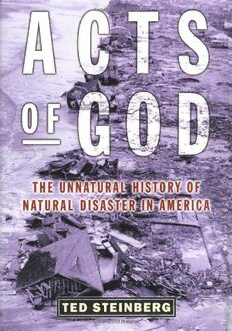
Acts of God: The Unnatural History of Natural Disaster in America PDF
319 Pages·2000·1.632 MB·English
Most books are stored in the elastic cloud where traffic is expensive. For this reason, we have a limit on daily download.
Preview Acts of God: The Unnatural History of Natural Disaster in America
Description:
Incredibly, the ten most costly catastrophes in U.S. history have all been natural disasters--seven of them hurricanes--and all have occurred since 1989, a period, ironically, that Congress has dubbed the Decade for Natural Disaster Reduction. Why this tremendous plague on our houses? While some claim that nature is the problem, in fact, as environmental historian Ted Steinberg explains, historically speaking, much of the death and destruction has been well within the realm of human control. Surveying more than a century of losses from weather and seismic extremes, Steinberg exposes the fallacy of seeing such calamities as simply random events. Acts of God explores the unnatural history of natural calamity, the decisions of business leaders and government officials that have paved the way for the greater losses of life and property, especially among those least able to withstand such blows--America's poor, elderly, and minorities. Seeing nature or God as the primary culprit, Steinberg argues, has helped to paper over the fact that, in truth, some Americans are better protected from the violence of nature than their counterparts lower down the socioeconomic ladder. How else can we explain that the hardest hit areas have been mobile home parks and other low-income neighborhoods? Beginning with the 1886 Charleston and 1906 San Francisco earthquakes, and continuing to the present, Steinberg spotlights the defective approach to natural hazards taken by real estate interests, the media, and policymakers. By understating the extent of storm damage in news reports and offering quick repairs and cosmetic solutions to damaged property, fundamental flaws in the status quo go unremedied, class divisions are maintained, and unsafe practices continue unquestioned. Even today, with our increased scientific knowledge, he shows that reckless building continues unabated in seismically active areas and flood-prone coastal plains, often at taxpayer expense. Sure to provoke discussion, Acts of God is a call to action that must be heard before the next disaster hits.
See more
The list of books you might like
Most books are stored in the elastic cloud where traffic is expensive. For this reason, we have a limit on daily download.
